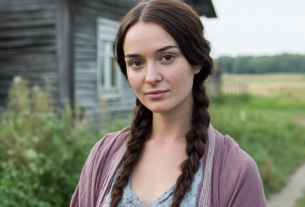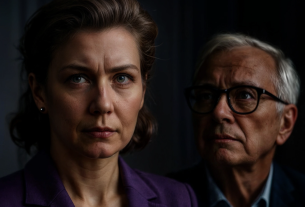“Mom is moving in tomorrow,” Kirill said, eagerly putting a piece of roasted chicken into his mouth. He said it as casually as if reporting the weather forecast for the next day. There was not a hint of doubt or question in his voice, only the statement of a fact wrapped in the self-satisfied complacency of someone who had made the only right decision for everyone.
Arina slowly put her fork down on the plate. She didn’t slam it or throw it down, but carefully placed it with some unnatural, measured precision. The sound of metal touching china seemed deafening at that moment. She leisurely chewed the last piece of her salad, swallowed, and took a small sip of water from the glass. All this time she didn’t take her eyes off her husband. Her gaze was calm, attentive, almost studying, as if she was seeing him for the first time. Kirill, absorbed in his dinner and his own importance, didn’t notice this change in her. He was expecting a reaction, but a delighted, grateful one for his care.
“He’s going to rent out his two-room apartment,” he continued, wiping the corners of his mouth with a napkin. He was clearly savoring the moment. “Can you imagine what a pension boost that’ll be? And help for us too. She cooks like a goddess and will help with cleaning—it’ll be easier for you. I’ve already talked with the realtor, good clients found, a decent young family.”
He was beaming. Shining like a polished samovar. He looked like a magician who had just pulled not just a rabbit but a whole elephant out of his hat, now waiting for thunderous, never-ending applause. He decided, he arranged everything, he made everyone happy: his mother and his wife. The perfect son, the perfect husband. But Arina was in no hurry to applaud.
She tilted her head slightly, a smile appearing on her lips. But Kirill suddenly felt uncomfortable, as if a draft had run down his spine. There was no joy or warmth in that smile, only a cold, razor-sharp interest of a surgeon examining an operating field.
“Excellent idea, dear,” her voice was even and calm, almost tender, contrasting with her gaze. “Simply brilliant. But you know what would be even better? If no one got hurt. If everything was fair.”
Kirill frowned in confusion. He didn’t catch the catch, still euphoric from his own generosity. He only saw benefits: a free cook, a free cleaner, and extra income for the family budget to spend on his fishing gear and new gaming console.
And then Arina struck. She leaned forward, resting her elbows on the table, and her voice acquired the firmness of tempered steel.
“If your mother is moving in with us and renting out her apartment, how about I invite my mother here too, for full ‘happiness’? Let’s see who drives whom out faster!”
Kirill choked. He started coughing, his face instantly turning bright red. He looked at his wife as if she’d proposed not just inviting his mother-in-law but settling a hungry alligator in their living room.
“Are you out of your mind?” he spat, taking a sip of water. “What does your mother have to do with this? This is totally different!”
“What’s different, Kirill?” Arina didn’t raise her voice, and this icy calmness affected him more than any shout. “Explain to me. Your mom is lonely, and mine is lonely. Yours wants to help us, and mine is sure that her help is absolutely necessary, she tells me this every day on the phone. Your mom will get a nice pension boost, and mine will save on utilities. Fair? I think it’s very fair.”
“But… but my mom is quiet, she won’t bother anyone!” he blurted out the first argument that came to mind, realizing how weak it was.
“And what, is mine going to run around the apartment banging a drum?” Arina smirked. “Mine is an angel compared to some. She’s an educated person, a music teacher with forty years of experience. She’ll play Chopin for us in the evenings. Of course, we don’t have space for a grand piano, but we’ll buy her a synthesizer. Isn’t that wonderful? A cultured atmosphere at home.”
Kirill opened and closed his mouth like a fish thrown onto the shore. He was trapped by his own arguments. Any attempt to object or belittle her mother would look like a direct insult and a blatant double standard. He couldn’t say, “My mom is better than yours because she’s mine.” He was caught like a beginner in a simple chess combination.
“Well, so what, dear?” Arina took her fork and demonstratively skewered a cucumber with appetite. “Do we invite both? We have a third room empty. We’ll put two beds there, on each side. It’ll be fun. A real Italian family. Decided?”
He silently pushed away the plate with the half-eaten chicken. His appetite was gone. He looked at his wife and understood she was serious and not bluffing. In her eyes burned the eager, merciless fire of a strategist anticipating an interesting game. He still believed it was some absurd whim, that she would come to her senses. He just didn’t know that this devilish plan was not hers but her brilliant mother’s, devised in a phone call an hour ago, and it was already set in motion.
Two days later, their three-room apartment stopped being theirs. It turned into a battlefield, a neutral territory where two warring powers met. The first to arrive was Raisa Zakharovna. She didn’t enter but rolled into the hallway like a bowling ball, followed by Kirill, loaded with two huge checkered bags and an old but well-kept suitcase on wheels.
“Well, welcome the lodger!” she proclaimed from the doorway, surveying the apartment with an owner’s assessing look. “Kirill, suitcase straight to the room, bags to the kitchen, there are groceries to keep fresh. Arinochka, what’s that dust in the corner? Should wipe it.”
She acted assertively, without pause, filling the whole space with herself. Her energy was like a natural disaster—noisy, overwhelming, and intolerant of objections. She went straight to the kitchen, opened the fridge, clicked her tongue seeing a half-empty shelf, and began unloading homemade preserves from her bags, decisively pushing Arina’s jar of aristocratic olives into the farthest corner. She didn’t ask for permission; she imposed her order, the only right one not subject to discussion.
An hour later, the doorbell rang again. Nina Pavlovna appeared quietly, almost silently, on the threshold. She wore an elegant coat, holding a small neat handbag. She was the complete opposite of Raisa Zakharovna—not a tsunami, but a slowly rising water level, noticeable only when it was already knee-deep.
“Good evening,” she softly said, extending her powdered cheek to Arina for a kiss. “Kirusha, hello. Looks like you already have guests.”
Her gaze slid over the hallway and stopped on Raisa Zakharovna, who was just emerging from the kitchen with a damp rag in her hand.
“Raisa Zakharovna,” Kirill introduced the mothers, feeling cold sweat run down his back.
“Nina Pavlovna,” Arina’s mother nodded with a polite but cool smile.
First blood was spilled that very evening. After dinner—cutlets brought by Raisa Zakharovna—the whole company moved to the living room. Raisa Zakharovna, as the rightful mistress, sat in Kirill’s favorite armchair and decisively grabbed the TV remote. At nine sharp started her series—a tearjerker saga about a hard woman’s fate.
“So, ‘Fragments of Happiness’ are starting now,” she announced, clicking the button.
“Could we switch to ‘Culture’? There’s a broadcast from the Vienna Opera today. Something for the soul, not this stuff,” came Nina Pavlovna’s quiet but insistent voice from the couch.
Her phrase “this stuff” sounded like a verdict on cheap mass culture. Raisa Zakharovna slowly turned her head. Her face, flushed after dinner, became like a thundercloud.
“I’ve been on my feet all day, moving things, I’m tired. I want to watch my series and relax.”
“You can relax with your eyes closed,” Nina Pavlovna retorted without changing her polite tone. “Good music, on the contrary, calms the nervous system. Kirusha, you don’t mind listening to Mozart?”
Kirill felt like a target aimed at by two sniper rifles.
“Moms, why are you like kids? Let’s watch the news—a compromise option.”
But compromise was no longer possible. It was a battle not for the channel but for power. Arina, sitting in another corner of the sofa, silently watched the scene with a slight, barely noticeable smile on her lips.
The next morning, the war moved to a new level. The battle for the bathroom started at seven a.m. Raisa Zakharovna occupied it first, for a long time, with loud sounds of flowing water and folk songs. Nina Pavlovna waited her turn with a stone face, then locked herself in the bathroom for no less time, but in complete, deadly silence, which irritated even more. Kirill, running late for work, had to brush his teeth in the kitchen.
The refrigerator turned into a map of hostilities. The right side was occupied by neat rows of jars and containers belonging to Raisa Zakharovna. The left by tidy, labeled boxes of Nina Pavlovna. If someone accidentally touched the other’s territory, it was considered an act of aggression. The culmination was borscht. Both mothers decided to cook it the same day. Two pots stood on the stove like two hostile camps, emitting completely different aromas and ideologies. In the evening, Kirill had to choose whose borscht he would eat. He knew any choice meant declaring war. Hell was just beginning.
Open hostilities of the first days quickly died down, replaced by something much more exhausting—guerrilla warfare. The air in the apartment became thick and motionless, like in a sealed crypt where every careless word could cause a collapse. The shouting and quarrels stopped but were replaced by a viscous, suffocating silence filled with disapproving looks, demonstrative sighs, and loud, emphasized quiet. Arina and her mother moved to the next phase of their plan: the methodical destruction of Kirill’s psyche.
The epicenter of the battles remained the kitchen. Raisa Zakharovna, as a true devotee of hearty, fatty food, cooked a lot and with grandeur, occupying the stove and oven for several hours. Nina Pavlovna, a supporter of healthy eating, quietly suffered, waiting for her turn to cook a dietary broccoli soup. One day, while Nina Pavlovna’s soup was simmering slowly, Raisa Zakharovna entered the kitchen with a salt shaker in hand.
“Oh, Ninochka Pavlovna, what an appetizing green soup you have!” she cooed. “Did you salt it? Because I’m frying cutlets for Kirusha, and I’m wondering if maybe it’s under-salted.”
“I salt it at the very end, Raisa Zakharovna, thank you.”
“Well, I’ll just try a little now, okay?” And without waiting for an answer, she scooped some broth with a spoon, grimaced, and decisively poured salt into the pot. “There! I just wanted to check if it was salted enough. Hand must have slipped. Old age, Nina Pavlovna, no joy.”
She left, leaving Nina Pavlovna staring at her ruined brew. She said nothing. She simply took the pot and silently poured its contents down the drain. Revenge was served the next day. Raisa Zakharovna was proud of her snow-white, starched blouse she wore “for going out.” Nina Pavlovna, starting a big laundry, “accidentally” included that blouse, washing it with Kirill’s new blue jeans.
“Raisa Zakharovna, don’t worry,” she said that evening with angelic innocence, showing the blouse with delicate blue stains. “I washed it with colored clothes. Thought to freshen it up. White fades so fast in this city, but now it has a noble shade.”
Raisa Zakharovna turned to stone. Her face became beet-red, and her hands clenched into fists. But she couldn’t prove anything. It was “help,” “care.”
But the main target of attacks was Kirill. He became the trophy both mothers tried to pull to their side. He no longer came home from work—he went to the scaffold. Every evening, inserting the key into the lock, he froze and listened, trying to determine the disposition of enemy forces by sounds. But he was always met by both, right in the hallway.
“Kirushenka, son, you’re home!” Raisa Zakharovna swooped at him, trying to grab his briefcase. “Tired, my dear? I made you mashed potatoes with cutlets, nice and hot!”
“Kirill, don’t rush,” Nina Pavlovna immediately joined, handing him slippers. “First wash your hands and change. You can’t bring street dust into the house. And dinner is better light—I made you a vegetable salad.”
They literally tore him apart. He sat at the table, and two plates were placed before him. He ate the mashed potatoes while Raisa Zakharovna looked triumphantly at Nina Pavlovna. He poked at the salad with a fork, and Nina Pavlovna threw a look of intellectual superiority at her rival. Kirill’s left eye began to twitch. He started to flinch at every sharp sound, almost stopped talking, answering with monosyllables. The house ceased to be a fortress; it became a torture chamber.
Arina did not participate in all this. She was Switzerland—neutral, polite, and impenetrable. In the evenings, she sat with a book while invisible storms raged around her. Once, when Kirill, driven to madness by an argument about how to iron his shirts, locked himself in the bedroom, Nina Pavlovna quietly passed by her daughter’s chair and whispered:
“A few more days, Arisha. The client is almost ripe.” Arina, without looking up from her book, barely nodded. Their plan was working flawlessly. The volcano was about to erupt.
A week passed. Seven days, each longer than the last. Kirill lost weight, looked haggard, dark circles under his eyes. His twitching left eye became chronic. He no longer tried to be a peacemaker; he turned into a ghost in his own home, trying to move around the apartment as quietly and inconspicuously as possible to avoid provoking another round of the invisible war. But that evening, avoiding a clash was impossible.
He came home from work, exhausted to the limit. Already in the entrance hall, he smelled a mixed scent of fried meat and boiled vegetables, and his stomach twisted with a bad premonition. He opened the door and froze. Both mothers waited for him in the hallway, standing on either side of the entrance like an honor guard at a mausoleum. Their faces were tense and solemn.
“Kirusha, come in quickly, I washed my hands, I made you your favorite chops with garlic!” Raisa Zakharovna announced loudly and cheerfully.
“Kirill, I made you steamed fish with asparagus. You can’t have so much fried food; it’s bad for your vessels,” Nina Pavlovna countered softly but firmly.
He silently passed by them, threw his briefcase on a chair, and disappeared into the bathroom. Ten minutes later, he sat at the kitchen table. As if on command, two plates were placed before him. On one steamed a ruddy, greasy chop next to a mountain of mashed potatoes. On the other lay a pale piece of white fish on several green asparagus stalks. It wasn’t dinner. It was a choice. A choice between the past and the future, between habit and care, between two women who had turned his life into a personal hell.
“Well, son, eat while it’s hot,” Raisa Zakharovna pushed her plate closer to him.
“Kirill, start with the fish; it’s easy on the stomach after work,” Nina Pavlovna did the same with her plate.
They both stared at him. Their gazes crossed above his head. He sat staring into the space between the two plates. He couldn’t eat. He couldn’t even breathe. He felt himself slowly but surely suffocated by this care.
“He’ll take the chop,” Raisa Zakharovna cut in. “A man needs meat, not this grass.”
“It’s not for you to decide what he needs,” Nina Pavlovna replied coldly. “Health is more important than momentary whims.”
And here the last thread holding his self-control snapped. He didn’t scream. He made some strange, hoarse sound like a wounded beast’s roar. He abruptly stood up, and the chair clattered backward.
“OUT,” his voice, which he himself didn’t recognize, was low and terrifying.
Both women fell silent and stared at him in shock.
“What, son?” Raisa Zakharovna stammered confused.
“OUT. BOTH. RIGHT NOW,” he articulated each word, looking somewhere through them. His face was white, and the twitching eye turned into a mad dance. “Take your things. And leave my house. Immediately.”
“Kirusha, what are you saying?” Nina Pavlovna tried to appeal to his reason.
“I said, GET OUT!” he slammed his fist on the table. Plates jumped and clinked. He didn’t look at them; he walked to the front door and opened it wide. A cold draft rushed into the electrified atmosphere of the kitchen. “You have five minutes.”
There was something in his voice and gaze that excluded any disputes or arguments. It was not anger but complete, absolute burnout, the final stage after which there is only emptiness. The mothers glanced at each other and understood it was the end. They silently, with offended looks, went to their room, grabbed their bags and coats. Three minutes later, they stood in the hallway. Kirill stood by the open door motionless like a statue. He didn’t help them or say goodbye. He just waited.
When the door closed behind them, he remained standing in the hallway for several more minutes. Then slowly locked the door. The apartment was filled with the long-awaited, deafening silence. No footsteps, no sighs, no rustling. Only peace.
Arina, who had been sitting in the living room all this time, slowly stood up. She calmly went to the kitchen, put both untouched plates in the fridge, then took out a bottle of expensive red wine from the bar and a tall glass. She poured herself wine, walked to the window, and took a small sip, looking at the lights of the night city. A smile of pure, unclouded triumph played on her lips. She had achieved her goal. The phone rang. It was her mother.
“Well?” came Nina Pavlovna’s quiet, businesslike voice on the line.
“Everything’s going according to plan, Mom,” Arina answered just as quietly, taking another sip. “Absolutely everything. You can come back home. You were brilliant.”
“I know, daughter. I know…”



